Dentures West Palm Beach
Regain a Beautiful, Confident Smile
Missing teeth can create several changes to your quality of life while wreaking havoc on your dental health. Significant tooth loss can make it almost impossible to chew certain foods, which can lead to nutritional deficiencies. Not to mention, your confidence can take a hit with each tooth you lose. You don’t have to live with the consequences of an incomplete smile. Dr. Asinmaz at Palm Beach Dental Excellence offers high-quality, natural-looking dentures in West Palm Beach to turn back the clock to restore a beautiful, functional smile. Call us to schedule an appointment and find out if dentures are right for you.
Why Choose Palm Beach Dental Excellence for Dentures?
- Custom-Crafted Prosthetics Tailor-Made for Patients’ Smiles
- Modern Dental Technology Used for Optimal Accuracy
- You Are Welcome to Use Your PPO Dental Insurance
Who’s a Good Candidate for Dentures?

The social stigmas attached to tooth loss and low self-esteem are common reasons people contact our office to replace their missing teeth. Your denture dentist in West Palm Beach can help patients who have good oral and general health regain a functional, confident smile. After examining your mouth, Dr. Asinmaz will create a personalized treatment plan to address your missing teeth. This may involve a little prep work, like tooth extractions or gum disease therapy; however, a healthy smile is crucial to restoring your smile. Keep reading to learn more about what makes a good candidate for dentures in West Palm Beach.
Effects of Missing Teeth
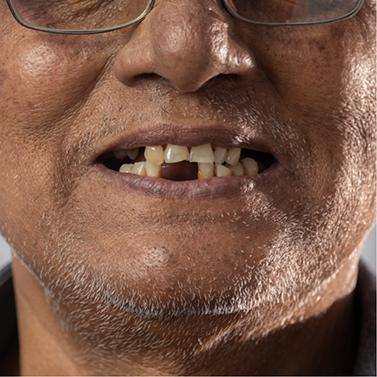
There can be various reasons why patients lose their teeth. Some of the more common causes include gum disease, tooth decay, and oral trauma or injury, according to the American College of Prosthodontists. Furthermore, certain systemic issues (such as inherited disorders) can lead to missing teeth.
Having gaps in your smile can result in further complications that you might not expect, so you’ll need to replace your missing teeth sooner rather than later. Some of the consequences of losing pearly whites include trouble eating, difficulty talking, facial sagging, and drastically reduced self-confidence. Furthermore, your nearby healthy teeth can begin to shift out of position to fill the space, and your jawbone can start to shrink or appear aged.
What Qualifies You for Dentures?
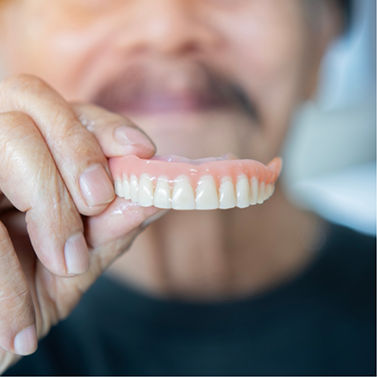
For the most part, anyone who’s struggling with tooth loss can be a good candidate for dentures. This restoration treatment has a long track record of being reliable for addressing missing teeth, tooth decay, and even sensitive teeth.
Even so, to maximize or ensure the success of your results, you’ll need to have a sufficient amount of bone density and healthy gum tissue. The number of teeth that you’re missing can also influence the kind of denture you’ll require. This means you may need to choose from different options like full dentures, partial dentures, or implant dentures.
Alternative Tooth-Replacement Options
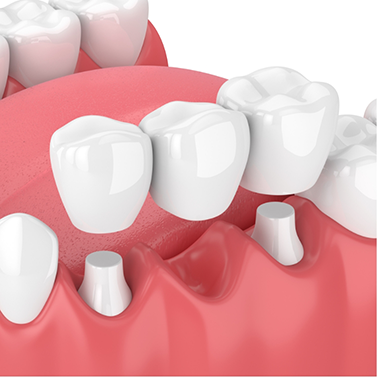
If it turns out you aren’t eligible for dentures, that’s okay! You can still explore other alternative restoration options that are also reliable, including:
- Dental bridges – These can benefit you if you’re missing several teeth in a row. However, you’ll need to have strong, sturdy, and healthy nearby teeth to support the dental bridge.
- Dental implants – These titanium posts will be directly embedded into your jawbone, anchoring your new set of teeth to a stable and lifelike foundation. That said, they’ll need sufficient bone tissue to work. While they do cost more upfront, the results can last a lifetime with proper care.
Learn More About Dental Bridges
Learn More About Dental Implants
Types of Dentures

You have more options than ever to treat several or all missing teeth. Dr. Asinmaz will explain all your options depending on your degree of tooth loss and personal preferences, which can include:
Partial Dentures
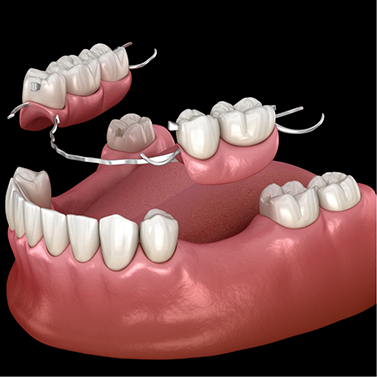
Patients who have a few healthy teeth can benefit from a partial denture. Dr. Asinmaz takes an impression of your mouth, which is used to recreate the surfaces of your lost teeth above the gumline. They are affixed to a gum-colored base that has a metal framework. It clips or clasps onto your remaining teeth to stay in place. Unlike a traditional bridge, a partial can treat nonconsecutive tooth loss.
Full Dentures
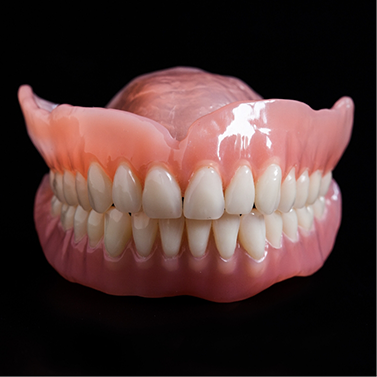
A full denture has been used for generations to treat an entire arch of lost teeth. An acrylic base is made from an impression of your mouth. Prosthetic teeth are attached to the base. The denture rests on top of your gum tissue, which is held in place using suction or an adhesive.
Implant Dentures
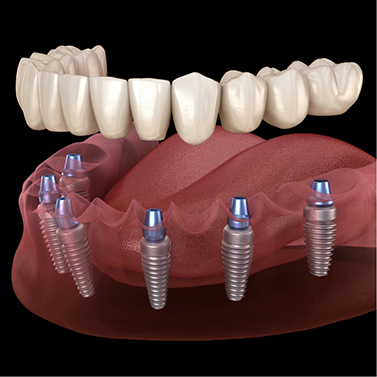
As an alternative to a traditional denture, 4 to 10 dental implant posts can anchor your new teeth to your jawbone. This provides a nearly perfect replica of your real teeth that’s proven to last for decades with the right care, like maintaining your oral hygiene. With implant dentures, you’ll never have to worry about any slipping or irritation for added peace of mind.
How Dentures Are Made
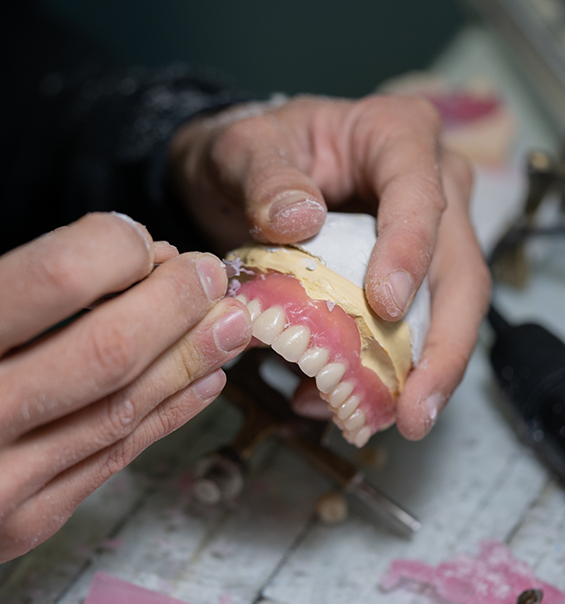
Dentures are an excellent option for patients who have experienced significant tooth loss. If you are thinking about getting dentures, you are likely interested in how they are made. Knowing how the process works can help you appreciate your new smile that much more! Whether you are getting partial or full dentures, here’s what the process typically looks like.
What Are Dentures Made Of?
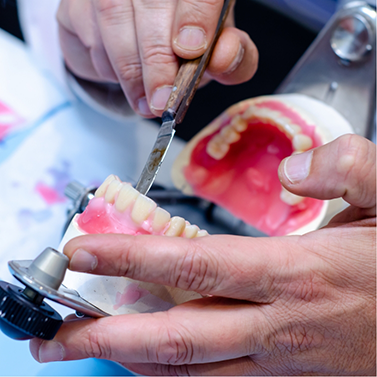
Dentures are made up of two different parts: the base and the replacement teeth. Here’s what each one consists of:
- Denture Base: This is the foundational structure that supports the replacement teeth. It can be made from a variety of materials, including acrylic, nylon, resin, porcelain, and metal. Full dentures are usually made from acrylic because it can be tailored to closely match the gum tissue. Partial dentures are often made using an acrylic base and metal clips to stay in place.
- Artificial Teeth: The replacement teeth are usually made from resin or porcelain because they both have a natural appearance. However, porcelain is most popular because it looks and feels like natural teeth. It’s also incredibly durable. However, it is usually only recommended for full dentures because porcelain can be abrasive on the adjacent teeth.
The Denture Creation Process
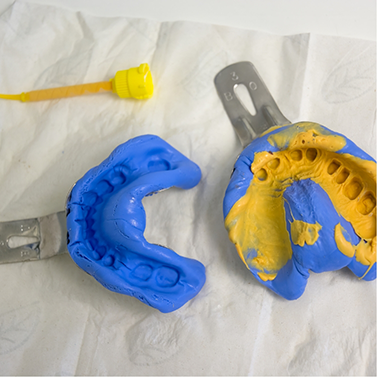
Each denture is customized for the patient’s mouth. This requires a multi-step process. Every treatment is different, but here is what the process typically looks like:
- Step 1: First, your dentist will take impressions of your upper and lower gums. This is used to create a plaster model that acts as a replica of your mouth. This model is used to ensure that your final denture is the perfect size and shape for you. During this time, measurements of the jaw are also taken.
- Step 2: The cast will be sent to the dental laboratory where your dentures will be made. There, they will create a wax version of your gumline.
- Step 3: Artificial teeth are then set into place using a mechanical device known as an articulator. The technician makes minor adjustments to the wax dentures to make sure they look just like your gums. The wax base is then used for your finished dentures.
- Step 4: The wax dentures are sent back to your dentist for a fitting. If they are approved, the dentures are sent back to the laboratory to complete the process.
- Step 5: Once back at the lab, the technician will boil the dentures to melt away the wax portions. To do this, the dentures are placed in a flask, or a holding device, into which plaster is poured to maintain the shape of the dentures. The entire flask is placed in hot water to melt the wax.
- Step 6: Holes are made in the teeth so the material can attach to it. A liquid separator is added to the plaster layer to stop the acrylic from sticking to it. Acrylic is then injected into the flask to replace the wax.
- Step 7: The plaster is carefully removed using special lab tools to reveal the denture. The acrylic dentures are placed in an ultrasonic bath to remove any remaining plaster.
- Step 8: Any excess acrylic will be cut from the denture. After trimming, the denture will be polished to perfection.
- Step 9: Now that your denture is complete, you can return to the practice for a fitting. Adjustments will be made if needed to ensure that everything feels and looks great!
Learn More About Teeth In A Day
Adjusting to Your New Dentures

If your mouth feels sore when you first get your dentures, this is very common. After a short period of time, your mouth will adjust to your dentures, and they will feel similar to your natural teeth. You can speed up the adjustment process by sticking to soft food, exercising your facial muscles, and experimenting with adhesive. If your discomfort persists, don’t hesitate to reach out so we can help!
The Benefits of Dentures

Losing teeth (no matter the number) is always a challenge. After all, the situation makes many everyday tasks harder. Still, you can trust dentures as a transformative tooth replacement option. They’ll restore your smile and thus improve your quality of life. In fact, Dr. Asinmaz is happy to tell you more about the benefits of dentures. Just keep reading or call our office to learn the details. From there, you’ll see what these dental prosthetics can do for your grin!
Psychological Benefits

Tooth loss is often hard to accept, especially when it just happened. Such a reaction is normal – most people are used to having full grins. As a result, though, the condition can lower one’s self-esteem and body image. Sufferers may then retreat from social settings, grow sad, and even develop severe depression.
Thankfully, dentures help avoid these outcomes. They restore a patient’s smile and boost their confidence in the process. From there, the denture wearer will be more likely to have a stable mood and reduced anxiety about looks, speech, eating ability, and more.
Clearer Enunciation

Whether you’re missing one tooth or many, lacking a full smile causes speech issues. People need pearly whites to position their lips and tongue for talking. As such, being without a few will cause you to struggle with pronunciation.
Of course, you can rely on dentures to solve this problem. They act as substitute teeth that properly support your tongue and lips. That said, you must adjust to them first. Speaking with dentures requires practice before they help you speak naturally.
Improves Nutrition

As you’d expect, meals are tricky when you lack teeth, especially since you can’t chew food as thoroughly. Consequently, not having a full smile can restrict your diet. You may have to forego tough but healthy foods due to your weakened bite force.
Alternatively, you can get dentures as a possible solution. These artificial teeth chew food almost as well as natural ones. Therefore, using them will widen your dietary options to ensure proper nutrition and digestion.
Preserves Oral Health

Aside from harming your looks, tooth loss worsens your smile’s health. The condition causes tooth gaps that often house harmful bacteria. Even worse, said gaps can gradually cause surrounding teeth to tilt, eventually causing them to fall out entirely, leading to a cycle where missing teeth lead to additional tooth loss.
Of course, patients can prevent this scenario by wearing dentures. These dental prosthetics “fill in” smile gaps and deprive germs of breeding grounds. Furthermore, their use reduces nasty wear and tear on your other teeth.
Expands Opportunities

For better or worse, most people notice your smile before anything else. It’s the part of your body that most affects first impressions. That being the case, a gleaming grin can help you bond with friends, family, co-workers, and more. The outcome would then be greater opportunities in various fields.
Well, it so happens that dentures help your smile make good impressions. The prosthetics use acrylic, lifelike teeth, which blend seamlessly with adjacent ones. Wearing the appliance, therefore, creates more social and professional chances for oneself. The restorations could even get you a raise or promotion at work!
Dentures Aftercare

While dentures can effectively replace missing teeth and restore your bite, you’ll still want to visit your dentist regularly for checkups. Not only will your dentist be able to monitor the condition of your restorations, but they’ll also ensure that no underlying issues are developing or spreading, such as gingivitis or an oral infection. Though you might be able to notice certain changes when wearing your dentures, it’s best to have a dental professional keep a close eye on your treatment. Here are several tips on caring for your dentures.
Removable Dentures
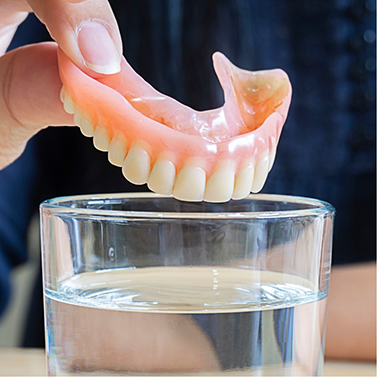
Remove After Eating
Be sure to remove your dentures and rinse them off with lukewarm water after every meal. This will help avoid accumulating debris, food, and plaque-causing bacteria. Avoid rinsing your dentures with hot water, as excessive heat can end up warping your restorations.
Clean Your Restoration
You’ll first want to remove your dentures before cleaning them, as you’ll need to clean the bottom side as well as your gums. Make sure to use a soft-bristled toothbrush with some hand soap, mild dish soap, or denture cleanser when cleaning your restorations. Avoid using regular toothpaste, as it can be too abrasive. If you aren’t putting them back on afterward, store them in a glass of water or denture-cleansing solution to keep them from drying out or losing shape. Before wearing them again, you should rinse them off thoroughly, as you won’t want to ingest cleaning materials.
Keep Your Dentures Safe
When you’re cleaning your dentures, make sure to have a towel underneath you so it can break the fall in case you drop them. This can help you minimize the risk of accidentally damaging your restorations and costing you more money. Also, make sure to store your dentures somewhere out of reach for small children and pets.
Remove Dentures When You Sleep
Before going to bed, take your dentures out and soak them overnight. Not only will this keep your restorations clean and in pristine condition until you wear them again, but it’ll also let you avoid complications with your gums. Leaving them in can cut off circulation and lead to soft-tissue irritation. Sleeping with your dentures on can also raise your risk of pneumonia and gum/tongue plaque.
Notice Changes
Make sure to stay vigilant for any changes you might notice in either your gums and/or dentures. The last thing you want to experience is a mouth sore, gum irritation, and indications of infection. The moment you notice that your restorations are clicking, shifting, or showing signs of not fitting properly, notify your dentist about it. They can help readjust or possibly replace your dentures if necessary. If they get damaged, do NOT try to repair them on your own. This can cause further damage or be hazardous.
Teeth-in-a-Day

If you’ve opted for Teeth-in-a-Day dentures, the aftercare process might look somewhat different compared to traditional ones. Since they’re attached to dental implants, you won’t have to remove your restorations to clean them. You’ll want to brush twice a day with a soft-bristled toothbrush just like your normal pearly whites. However, avoid using abrasive toothpaste and make sure to invest in floss threaders to help you clean underneath your dentures. You can also try using a water flosser to get to the hard-to-reach areas and rinse with an antibacterial mouthwash to avoid plaque and tartar growth.
Understanding the Cost of Dentures
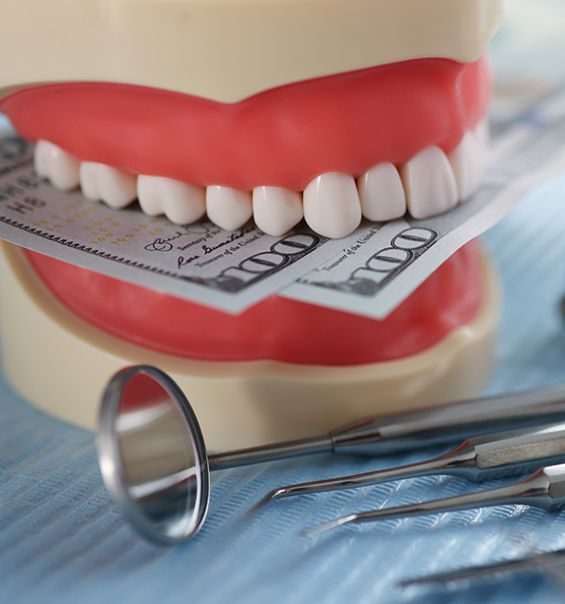
No discussion of dentures is complete without going over the amount you’ll likely need to pay for your prosthesis. We’ll give you an estimate of the final price and explain what factors helped us arrive at the given number. Then, if you have a PPO dental plan, we can take a look at your benefits to see how much your insurance company is willing to pay for dentures. Here’s a bit more information about the costs associated with your new smile.
Factors That Affect the Cost of Dentures

Not everyone will pay the same amount for dentures. Each case has many unique aspects that affect the final cost. Our team will consider every one of these factors very carefully to ensure that the estimate we give you is as accurate as possible. Here are just some of the things we’ll need to think about:
- Extent of Tooth Loss: Did you lose a single tooth, or are you missing several teeth? Are there gaps in just one arch or both arches? The number of teeth that need to be replaced plays a large role in determining the final price.
- Types of Dentures: If you choose to get an implant denture instead of a traditional one, we’ll need to factor in the cost of dental implant surgery.
- Preliminary Work: When the teeth that need to be replaced are still in the arch, you will have to pay for a tooth extraction. Depending on your oral health, you might also need to make room in your budget for gum disease therapy.
- Materials: Some materials have a higher cost but offer improved durability and comfort. Think carefully about the quality of your dentures instead of automatically choosing the cheapest product.
Are Implant Dentures More Expensive?
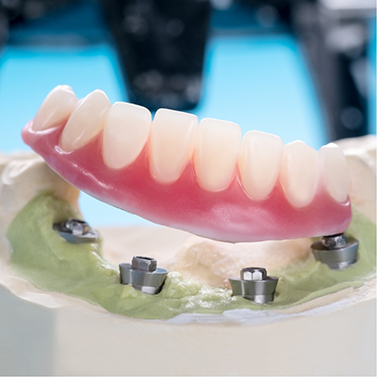
As noted above, implant dentures do indeed tend to cost more. However, they can be the best choice for your budget in the long term. Dental implants often have lifespans of more than 30 years, which means you’re less likely to need to replace them. Also, implant dentures have several priceless benefits, such as the improved confidence that comes from knowing your smile won’t slip.
Does Dental Insurance Cover Dentures?

If you have dental insurance, it will most likely pay for dentures, although it’s recommended that you double-check with your insurance carrier to make sure. Coverage will usually be around 50% since getting dentures is often classified as a major procedure; that said, it ultimately depends on what plan you have. Our team can file claims for many major PPO insurance plans.
Other Options for Making Dentures Affordable

There are ways to make paying for dentures less of a financial hassle. One method is to sign up for a CareCredit payment plan. You can pay in installments that don’t put as much strain on your budget, and some of their plans come with no interest.
Denture FAQs
What Qualifies You for Dentures?
Whether you are missing a few teeth or an entire arch, you may be a candidate for dentures. During your initial consultation, your denture dentist in West Palm Beach will take the time to conduct an oral exam, ask you a few questions, and learn all about your smile goals. From there, he can determine your viability. The good news is most patients who are diligent about their oral health are rock-solid candidates! Even if an untreated condition like gum disease initially stands in your way, the appropriate restorative care can be worked into your treatment plan.
Is It Hard to Talk with Dentures?
As your mouth adjusts to your new dentures, you may experience a bit of a learning curve. During this time, it’s important to be patient with yourself and take it slow. Try reading a magazine aloud and repeating the more difficult words (like “sixty”) until you’re able to say them without a lisp. You should also try biting down and swallowing before you speak, which will prevent slippage and excess saliva from messing up your speech. Remember: the more you practice, the faster the adjustment process will be.
What Can’t You Eat with Dentures?
Whether you’ve been struggling with tooth loss for years or a couple of months now, you know the detrimental impact it can have on your smile. Fortunately, dentures can help restore your bite force, allowing you to enjoy your meals pain-free again! Still, it is a good idea to avoid foods that can tug on them like peanut butter and gummy candies. Nuts, raw carrots, and other hard items pose a risk of damaging your restoration as well which is why you should always exercise caution.
How Can I Reduce the Cost of Dentures?
If you have dental insurance, then you’ll be happy to know many plans cover at least a portion of the cost. We also happily accept flexible financing through CareCredit, which can break up the cost into manageable payments that fit into your monthly budget. Don’t worry – our team will review all the various financial options with you at your consultation. That way, you can make an informed decision on which path is right for you.
